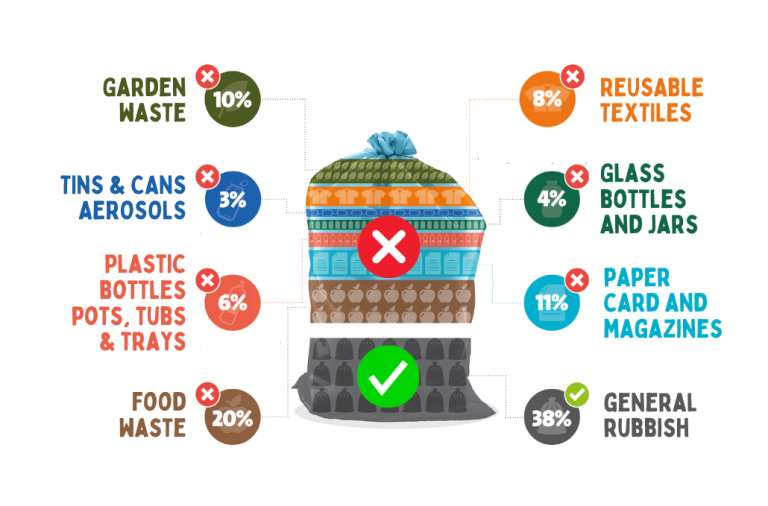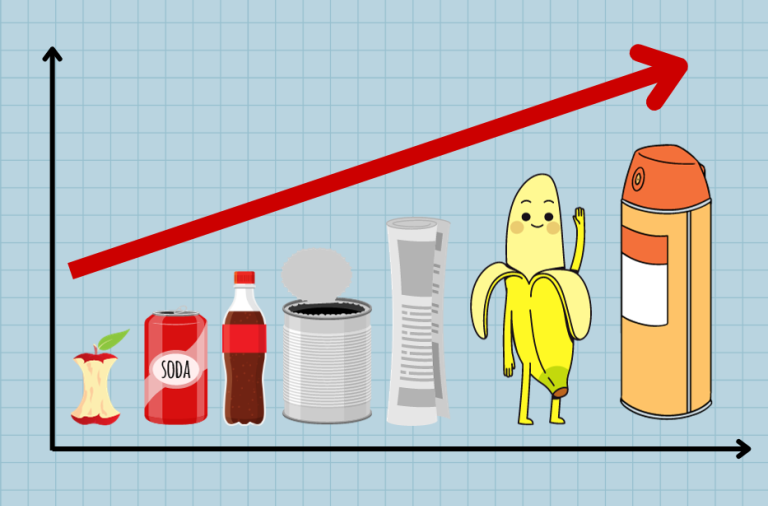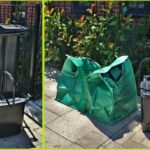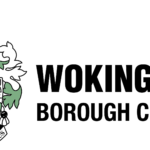Taken from Wokingham Borough Council News
Residents in Wokingham Borough are recycling more of their waste than ever, according to the latest figures – but there’s still room for improvement as the council gears up to change most households’ kerbside collections this summer.
The borough’s recycling rate has increased to 57 per cent, meaning well under half (43 per cent) of all domestic waste is now burned for energy or sent to landfill as general rubbish. Last year’s recycling rate was 54 per cent, while almost a decade ago it stood at 34 per cent.
Wokingham Borough most recently placed 42nd for recycling out of 333 English councils, up from 204th in 2018 and 80th in 2020, and it hopes to see further progress once the latest national league tables are published.
Additionally, the total weight of rubbish continues to decrease despite the population increasing. Last year, residents discarded 23,898 tonnes compared with 28,334 tonnes in 2015 – a reduction of 15 per cent or 4,345 tonnes, the weight of over 400 blue whales.
The council is thankful for this impressive effort because it costs much less to recycle every tonne of waste than to dispose of it as rubbish. This will help its efforts to save money as it, like other local authorities, faces unprecedented financial challenges.
Still too much recycling in some blue bags
However, some blue rubbish bags are still being more than half-filled with recyclable materials. A recent sample of bags put out for collection in selected streets found 62 per cent of the contents could have been recycled, while just 38 per cent was non-recyclable.

This shows some households could still improve, which is important because the Government expects all councils to recycle 65 per cent of their waste by 2035. The council hopes to exceed this to help meet its own climate emergency goals.
To further boost recycling, it is changing kerbside waste collections for most households from August, which will reduce the borough’s environmental impact and carbon emissions while making those much-needed savings.
For more about this, residents can sign up to the fortnightly Rubbish & Recycling newsletter.
Food waste – most room for improvement
From August, rubbish will be collected fortnightly from a 180-litre black wheeled bin. Recycling will also be collected fortnightly, on weeks when rubbish isn’t collected, from the existing reusable green bags.
However, food waste collections are staying weekly – and residents should use these as much as they can, as the biggest share of recyclable material found in the blue bag sample was food waste.
It made up 20 per cent of all contents, but should have been disposed of in kerbside food bins. These were introduced in 2019, along with the optional indoor food caddies, increasing the borough’s recycling rate from 35 per cent to 50 per cent in 2020.
Some residents still don’t use a food bin and caddy or don’t even have one. These can be collected free of charge from hubs around the borough, once stocks return.
What else should be recycled
Paper, cardboard and magazines made up 11 per cent of the blue bags sample’s contents alongside plastic bottles, tubs and trays (six per cent) and tins, cans and aerosols (three per cent).
These should all go in green recycling bags and be washed and squashed, where possible, to take up less space.
Meanwhile, garden waste made up 10 per cent of the contents but can go in brown bins or bags, which are collected fortnightly as part of an optional garden waste collection service.
Eight per cent of the blue bags’ contents were reusable textiles like clothes, which can be given away through charity shops and clothing banks or sold or donated online.
The remaining four per cent was glass, which can be recycled at bottle banks. Residents can find their nearest recycling points for glass, and other materials like soft plastics or batteries, using the free Recycle Now locator tool.
A good time to get ready for change
Cllr Ian Shenton, executive member for environment, sport and leisure, said: “We know life is complicated for many people, and the cost of living crisis has sadly made things harder, so we’re proud that residents are still making the effort to recycle more.
“We don’t want to single anyone out with the findings from our blue bag sample, but it’s surprisingly easy to join in and recycle more through small changes to your daily habits. It all adds up to make a big difference in helping the environment.
“By making the most of food waste collections, you’ll still have lots of your waste collected weekly from August – and it won’t rot in your black bin, making your rubbish easier to store for two weeks. It’s free and easy to get a food bin and caddy or more green recycling bags, which can make a big dent in how much rubbish you put out.
“Change is coming for most households and we know this can be daunting, but there’s plenty of time to prepare and we’re here to help everyone get ready for a greener future.”
A snapshot in time, not the bigger picture
The council’s sample was taken from a range of streets, reflecting only the types of properties which are changing to the new collections in August. Those with no front or side storage and no outside access to a back garden, or those on narrow lanes which regular collection lorries can’t get down, are staying on weekly bagged collections.
The sample proves that further improvement is possible if everyone plays their part – and If every resident recycled all they could, the borough’s recycling rate would be about 70 per cent, which would be higher than any council in England has managed to achieve before.
Here’s your “bintroduction” 🤝 to the wheeled rubbish bins that most homes will get from late May!
📅 The new collections will start in August – more at https://t.co/kxj2gofn9A
🌐 Subscribe to our fortnightly Rubbish & Recycling newsletter at https://t.co/jEa7jt3syV pic.twitter.com/HD34k0tkuw
— Wokingham Borough Council (@WokinghamBC) January 11, 2024
Why collections need to change
More than 85 per cent of English councils now collect rubbish one week and recycling the next, some using recycling bags. This has significantly increased their recycling rates because residents are encouraged to think more carefully about how they dispose of their waste.
Reading and Bracknell Forest’s recycling rates increased by 10 per cent or more when they changed collections and if Wokingham Borough can achieve this, it could soar into the top 10 nationally from its current position of 42nd.
As well as increasing recycling, which is better for the environment as it results in fewer carbon emissions, the changes should save more than £1 million a year – largely because recycling waste costs much less per tonne than burning it for energy or sending it to landfill.
The council faces a “triple threat” of rising costs, low funding from Government and growing demand for services like adults’ and children’s social care, which account for about 60p in every £1 collected in council tax.
It must save money to protect services for the vulnerable and avoid effective bankruptcy, which has happened to other councils, and it continues to lobby Government for a fairer deal on funding.







